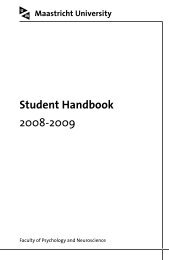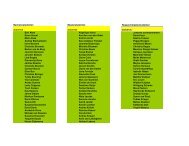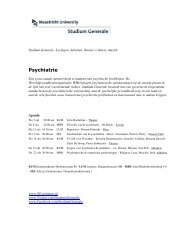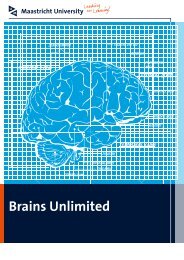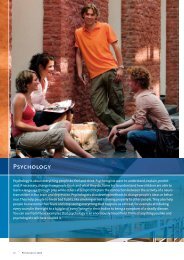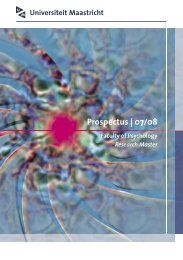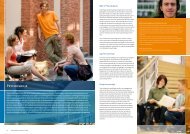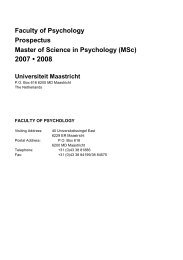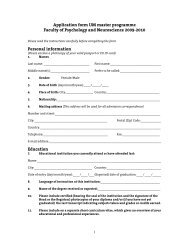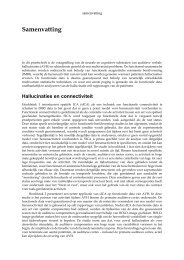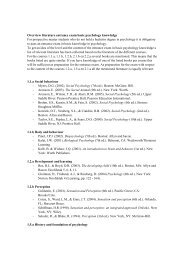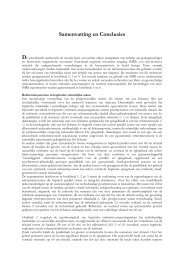Prospectus | 08/09 - Psychology and Neuroscience - Maastricht ...
Prospectus | 08/09 - Psychology and Neuroscience - Maastricht ...
Prospectus | 08/09 - Psychology and Neuroscience - Maastricht ...
You also want an ePaper? Increase the reach of your titles
YUMPU automatically turns print PDFs into web optimized ePapers that Google loves.
Chapter 4 - Specialization Neuropsychology<br />
Instructional Approach<br />
A series of four lectures for each of two broad themes. Faculty members from each of<br />
the four specializations will present lectures in successive weeks.<br />
Required readings, assigned by each lecturer, will be made available prior to the first<br />
meeting of a new theme.<br />
Form of Assessment<br />
Following each series of four lectures, an open book exam will be given, covering<br />
material from all of the assigned readings <strong>and</strong> lectures for that theme. The final pass/<br />
fail score is based on the average grade obtained on the two exams.<br />
69<br />
4.2 Core courses<br />
| 441NP Brain Damage – 4 credits<br />
Coordinator: Martin van Boxtel, Psychiatry & Neuropsychology (FHML), Phone 38 81028,<br />
12 Dr. Tanslaan, Room 4.E3.017, E-mail: m.vanboxtel@psychology.unimaas.nl<br />
Description of the Course<br />
Students are introduced to the fields of Behavioural Neurology <strong>and</strong> Neuropsychology:<br />
what do pathological conditions in brain structure <strong>and</strong> function tell us about the relationship<br />
between brain <strong>and</strong> behaviour? Much of what we know about cognitive processes<br />
<strong>and</strong> affective functioning has been learned from close observation of patients<br />
with damage to the central nervous system. This course reviews mechanisms of the<br />
relationship between brain <strong>and</strong> behaviour that are the basis of neuropsychological dysfunctions<br />
in persons who suffer from brain damage. Students acquire knowledge about<br />
the causes <strong>and</strong> neurobiological effects of brain lesions, <strong>and</strong> get acquainted with the<br />
taxonomy of common neurological <strong>and</strong> neuropsychological syndromes. Functional disturbances<br />
that occur after focal or diffuse lesions in different cortical areas, in connecting<br />
tracts, in limbic <strong>and</strong> other subcortical brain structures are discussed, together with<br />
the neurocognitive assessment procedures that are necessary to identify such deficits,<br />
including disorders of memory, praxis, language, visual spatial abilities <strong>and</strong> executive<br />
function. After completion of the course the students will have a broad overview of<br />
functional brain anatomy (including lobar anatomy <strong>and</strong> cerebral vascularization), the<br />
neurophysiology of brain repair, <strong>and</strong> the neurological diseases (e.g. brain trauma, stroke,<br />
<strong>and</strong> epilepsy) that are relevant for Neuropsychology, both as a clinical <strong>and</strong> a research<br />
discipline. Finally, the student will be familiar with the fundamental processes involved<br />
in functional brain plasticity. This knowledge is essential to underst<strong>and</strong> the principles of<br />
neuropsychological rehabilitation in order to support or even improve residual function<br />
after brain damage <strong>and</strong> to ameliorate the life quality of neurological patients.<br />
Literature<br />
• Selected readings from neuropsychological <strong>and</strong> neurological h<strong>and</strong>books;<br />
• Course syllabus (e-reader).



